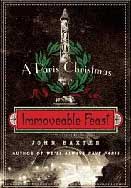Immoveable Feast

- SUBSCRIBE
- ALREADY SUBSCRIBED?
BECOME A BONJOUR PARIS MEMBER
Gain full access to our collection of over 5,000 articles and bring the City of Light into your life. Just 60 USD per year.
Find out why you should become a member here.
Sign in
Fill in your credentials below.
 Most years, the first queries from the United States or Australia arrive just after Thanksgiving,
Most years, the first queries from the United States or Australia arrive just after Thanksgiving,
“We’re thinking,” say friends, “of a romantic Christmas trip to Paris. Which would be the best hotel? What restaurants offer a really interesting Christmas dinner? And is there a chance of spending the day with a typical French family? Please don’t go to a lot of trouble. Just give us half dozen names or so. We’ll do the rest.”
Answers to most questions about Paris, from “Where are the best antique markets?” to “Do I need a converter for my laptop?”, require at least a page. (Some, like “What’s the finest cheese shop?”, should not be attempted under book length.) But the one about Christmas is easy.
Which Paris hotels provide the warmest welcome to Christmas visitors from overseas?
Sad to say, almost none of them.
Which restaurants serve the best Christmas dinner?
See answer above.
And Christmas with a French family?
Regrettably, not a chance.
But, demand the potential visitors, the French do celebrate Christmas? Right?
Indeed they do – elaborately and intensively. No other festival on the calendar even comes close.
Think of that sense of family solidarity, reconciliation and homecoming that characterises the US Thanksgiving. Combine it with the affirmation of shared values found in a nationalist festival like Russia’s May Day or Australia’s Anzac Day. Toss in the eating and drinking that distinguishes a German beer festival. Now you have some idea of a French Christmas.
But, reasons the potential visitor, you don’t seriously mean that when the French sit down to celebrate this national outpouring of good nature, there’s no room at the table for one or two more friendly faces?
Tell you what – we’re coming anyway…you old Scrooge.
And a few tough travellers always do.
Poor devils.
Every Christmas Eve, my French wife Marie-Dominique and I drive out of Paris with our daughter Louise, heading for the country house of my mother in law. The back of the car is loaded with gifts, with food and wine, and the ingredients and utensils to prepare a four- or five-course meal for up to twenty people.
It’s an easy drive, because the streets are deserted. Every shop is closed. Most are shuttered, their green-painted metal grilles wound down over darkened windows. On some, a discreet handwritten note explains “Fermeture Annuelle” – Annual Closing.
Most distributeurs de billets – ATMs – are empty, and will remain so for days: the staff who refill them won’t work over Christmas. Along the habitually traffic-choked Boulevard Haussmann, the block-long department stores of Printemps and Galeries Lafayette, jammed with shoppers on Christmas Eve, lie silent and dark, like ships moored on a frozen canal.
Although cafes and restaurants show no lights, here and there a few heavily-overcoated tourists hover on the pavement. Lifting a gloved hand to shade their eyes, they lean to the glass and peer, incredulous, at the dark interior, the chairs piled on tables, hoping for some sign of life… of Christmas. From the warmest spot, under a radiator, the café cat returns their look with indifference.
As these sad figures fall behind us, I feel a helpless compassion. That this intensively social city, normally so welcoming, should turn its back on a visitor seems the cruellest of betrayals.
Ernest Hemingway called Paris “a moveable feast”. He meant to compare it to those events of the Christian calendar – Lent, Pentecost – that change their date depending on when Easter falls. There is, the term implies, no “right” time to discover Paris. Its pleasures can be relished at any moment in one’s life.
But the phrase is subject to another interpretation. At Christmas, the spirit of Paris moves elsewhere. Its soul migrates, and this most beautiful of cities briefly falls empty.
But where do the French go at Christmas? And what takes place there?
IMMOVEABLE FEAST details Christmas as I’ve come to know it over almost twenty years as part of a French family. Since I also cook Christmas dinner for that family, of up to 18 people, it also describes, in detail, the complexities of assembling such a huge meal – in this case built around a sucking pig, with side dishes, dessert, wine and trimmings.
Richard Rayner wrote in the LOS ANGELES TIMES, “Baxter, the film critic and biographer of Spielberg, Buñuel and others, fell in love and moved from Los Angeles to Paris some years back, from whence he has dispatched a series of fluent, witty and moving memoirs. The first, "A Pound of Paper," detailed his obsession with books and his early, failed, literary scufflings. The latest, subtitled "A Paris Christmas," tells how he prepared and cooked a feast for his French in-laws. To this daunting task Baxter brought a flair that is reflected here on the page. "Even as I washed down a butter-drenched gobbet of tender lobster with a glass of crisp Pouilly-Fuisse, I could feel our Christmas dinner slipping out of control," he writes, and the prose invites us to savor and enjoy the giddy slide. A swift yet sumptuous read.
© John Baxter


